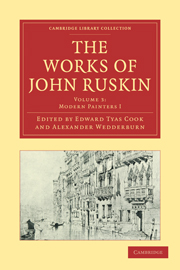Book contents
- Frontmatter
- Contents
- LIST OF ILLUSTRATIONS
- INTRODUCTION TO THIS VOLUME
- BIBLIOGRAPHICAL NOTE
- MODERN PAINTERS VOLUME I
- AUTHOR'S PREFACE TO FIRST EDITION (1843)
- AUTHOR'S PREFACE TO SECOND EDITION (1844)
- AUTHOR'S PREFACE TO THIRD EDITION (1846)
- AUTHOR'S PREFACE TO NEW EDITION (1873)
- AUTHOR'S SYNOPSIS OF CONTENTS
- PART I OF GENERAL PRINCIPLES
- SECTION I OF THE NATURE OF THE IDEAS CONVEYABLE BY ART
- CHAPTER 1 INTRODUCTORY
- CHAPTER II DEFINITION OF GREATNESS IN ART
- CHAPTER III OF IDEAS OF POWER
- CHAPTER IV OF IDEAS OF IMITATION
- CHAPTER V OF IDEAS OF TRUTH
- CHAPTER VI OF IDEAS OF BEAUTY
- CHAPTER VII OF IDEAS OF RELATION
- SECTION II OF POWER
- PART II OF TRUTH
- SECTION I GENERAL PRINCIPLES RESPECTING IDEAS OF TRUTH
- SECTION II OF GENERAL TRUTHS
- SECTION III OF TRUTH OF SKIES
- SECTION IV OF TRUTH OF EARTH
- SECTION V OF TRUTH OF WATER
- SECTION VI OF TRUTH OF VEGETATION.—CONCLUSION
- Appendix
- Plate section
CHAPTER VII - OF IDEAS OF RELATION
Published online by Cambridge University Press: 07 September 2011
- Frontmatter
- Contents
- LIST OF ILLUSTRATIONS
- INTRODUCTION TO THIS VOLUME
- BIBLIOGRAPHICAL NOTE
- MODERN PAINTERS VOLUME I
- AUTHOR'S PREFACE TO FIRST EDITION (1843)
- AUTHOR'S PREFACE TO SECOND EDITION (1844)
- AUTHOR'S PREFACE TO THIRD EDITION (1846)
- AUTHOR'S PREFACE TO NEW EDITION (1873)
- AUTHOR'S SYNOPSIS OF CONTENTS
- PART I OF GENERAL PRINCIPLES
- SECTION I OF THE NATURE OF THE IDEAS CONVEYABLE BY ART
- CHAPTER 1 INTRODUCTORY
- CHAPTER II DEFINITION OF GREATNESS IN ART
- CHAPTER III OF IDEAS OF POWER
- CHAPTER IV OF IDEAS OF IMITATION
- CHAPTER V OF IDEAS OF TRUTH
- CHAPTER VI OF IDEAS OF BEAUTY
- CHAPTER VII OF IDEAS OF RELATION
- SECTION II OF POWER
- PART II OF TRUTH
- SECTION I GENERAL PRINCIPLES RESPECTING IDEAS OF TRUTH
- SECTION II OF GENERAL TRUTHS
- SECTION III OF TRUTH OF SKIES
- SECTION IV OF TRUTH OF EARTH
- SECTION V OF TRUTH OF WATER
- SECTION VI OF TRUTH OF VEGETATION.—CONCLUSION
- Appendix
- Plate section
Summary
General meaning of the term.
I use this term rather as one of convenience than as adequately expressive of the vast class of ideas which I wish to be comprehended under it, namely, all those conveyable by art, which are the subjects of distinct intellectual perception and action, and which are therefore worthy of the name of thoughts. But as every thought, or definite exertion of intellect, implies two subjects, and some connection or relation inferred between them, the term “ideas of relation” is not incorrect, though it is inexpressive.
What ideas are to be comprehended under it.
Under this head must be arranged everything productive of expression, sentiment, and character, whether in figures or landscapes, (for there may be as much definite expression and marked carrying out of particular thoughts in the treatment of inanimate as of animate nature,) everything relating to the conception of the subject and to the congruity and relation of its parts; not as they enhance each other's beauty by known and constant laws of composition, but as they give each other expression and meaning, by particular application, requiring distinct thought to discover or to enjoy; the choice, for instance, of a particular lurid or appalling light to illustrate an incident in itself terrible, or of a particular tone of pure colour to prepare the mind for the expression of refined and delicate feeling; and, in a still higher sense, the invention of such incidents and thoughts as can be expressed in words as well as on canvas, and are totally independent of any means of art but such as may serve for the bare suggestion of them.
- Type
- Chapter
- Information
- The Works of John Ruskin , pp. 112 - 115Publisher: Cambridge University PressPrint publication year: 2010First published in: 1903



